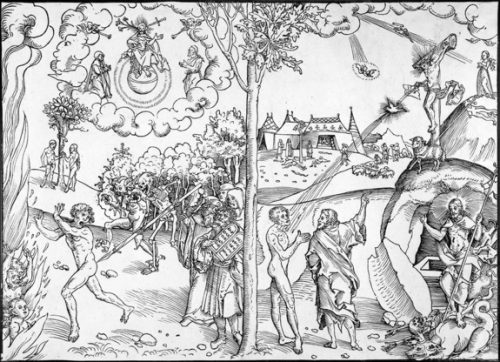

There are more than 11,000 species of grasshopper. The Acrididae family comprises about 10,000 of those species, accounting for nearly all grasshoppers in the United States. They’re harmless creatures, really. Plant-eaters, the lot of them, and many produce a gentle, familiar sound by rubbing the ridges of their hind legs against the edges of their forewings. They come in different shapes and sizes, and the color schemes on different species range from bland to beautiful.
Locusts, on the other hand, are not so meek. In fact, they exhibit terrible hostility and wreak legendary devastation. Often, where they go, famine and death follow, and they’ve been doing it for thousands of years. The Ancient Egyptians carved images of locusts into their tombs. In the Bible, God uses locusts as judgment and prophets invoke them as curses (or odd folks like John the Baptizer use them as food). The Quran references them, too, also as judgment. Locusts are, without question, one of the greatest natural menaces from prehistory through today.

Here’s the thing: there is no taxonomic distinction between grasshoppers and locusts. Grasshoppers become locusts (changing morphologically and behaviorally) due to overcrowding. The overstimulation triggers a release in serotonin, causing them to change color and start swarming. Under the right conditions, locusts from different regions will join together and form what are officially called “plagues.”
A grasshopper alone is harmless.
Overstimulated grasshoppers together are a plague.
There is perhaps no better analogy for human behavior. Of course, individual human beings can do quite a bit of harm, but the scope is usually fairly limited. There’s no denying that gathering into groups often leads to less-than-productive behavior at best, and positively evil behavior at worst.
Collective misbehavior, groupthink, and confirmation bias take many forms, from the banal and ignorant to the menacing and murderous. Sometimes it results in a few friends attempting a dangerous stunt they’d otherwise never dream of trying. Other times, though, it has more catastrophic effects like antisemitism and xenophobia, or like the moral panic surrounding satanic ritual abuse.
In THE MATRIX, Agent Smith discovers something like this about human beings. When trying to classify our species, he decides that we can’t be mammals since we generally do not reach “a natural equilibrium with the surrounding environment.”

Instead, he concludes the following:
“You move to an area and you multiply and multiply until every natural resource is consumed and the only way you can survive is to spread to another area. There is another organism on this planet that follows the same pattern…You’re a plague and we are the cure.”
A plague. Human beings are a natural disaster. Pack us together too tightly and we feed off of one another and breed destruction.
My wife and I have just returned from a trip to Berlin. We stood in the room where 15 Nazi officers decided on The Final Solution. We walked the grounds of Sachsenhausen and saw its gallows and read about the thousands of people imprisoned and murdered there. We tried to catch our breath as we listened to tour guides tell us about the Third Reich’s “medical” experiments. We stared at the disorienting, imposing Memorial to the Murdered Jews of Europe. And we reflected on the depths of human depravity and wondered about how so many could have been guilty of so much all at once.
We all prefer an anthropology that insists on humanity’s basic goodness. We would rather hear, when someone or a group of people do something terrible, that something has gone terribly wrong.
Maybe that view isn’t completely without warrant. Most people don’t commit horrific acts of violence or exploit others on a massive scale. Sure, everyone makes mistakes, but they’re not global killers.
The grasshopper offers an explanation for that deceptive docility, though. It might appear calm and gentle, but deep down, it’s a plague waiting to happen.

Our true nature as human beings might lie dormant (or exist only in our minds), but we are capable of dreadful things. And it’s often other human beings that draw it out of us. Give us a crowd with the right leader, and we’ll countenance all manner of appalling behavior.
If we were basically good, we wouldn’t have that capability. Instead, we’d easily resist the temptation to rally for unjust causes or perpetuate dangerous ideologies. But, no. Our true nature is undeniable, and it often comes out, especially when we get together.
Together, Americans prosecuted a McCarthyist witch-hunt against communism. Together, Germans murdered millions and ravaged Europe. Together, the crowd called for the execution of Jesus of Nazareth and demanded the release of a notorious insurrectionist.
Together, we’re capable of horrible things.
The Bible warns us several times to avoid bad friends, foolish counsel, and unwise leaders. The writers were concerned about the dangers of free association. We are easily led astray or swept up. We’re vulnerable creatures, and our desire for acceptance often overrides our system and takes control.
It’s bleak from all sides, it seems. So, how does the gospel address our insidious tendency toward collective foolishness and atrocity?
“Getting saved” doesn’t equal “getting wise.” And if the 20th Century (or any century, for that matter) is any indication, people claiming Christianity aren’t immune to frenzy, paranoia, misplaced rage, or even outright systematic extermination of their so-called “enemies.”
(Cue the folks who will say that those people weren’t real Christians.)
The law and the gospel are not divine instruction manuals, written to help us become the best versions of ourselves. No, they’re divine execution. They’re designed to kill us and impute to us an alien righteousness.

Salvation is not about making us better and better, but rather about us recognizing more and more how truly depraved we are. It’s about death and dying, destruction of the self.
What does this have to do with stopping us from joining the masses on a crusade? It’s hard to say. One possible answer is that the gospel binds us together (like it or not) with a group of people who – in the best case – acknowledge that their very existence begins with their sinfulness and need for redemption.
But it’s still a toss-up. Again, look at history. Look at yourself. This one doesn’t have as much of a happy ending. But at the very least, it’s worth remembering that just because we’re Christians doesn’t mean we won’t join up and wild out.
Well, maybe there’s some comfort here. Hear the word of the Lord to all who truly turn unto him:
Come unto me all that travail and are heavy laden, and I will refresh you.
God so loved the world that he gave his only-begotten Son, to the end that all who believe in him should not perish, but have everlasting life.
This is a true saying, and worthy of all people to be received: that Christ Jesus came into the world to save sinners.
If anyone sins, we have an Advocate with the Father, Jesus Christ the righteous, and he is the propitiation for our sins; and not for our sins only, but for the sins of the whole world.
In other words: while, like the grasshopper, we’re capable of unthinkable destruction, God loves us anyway.
https://www.youtube.com/watch?v=N5Ts4M3irWM

COMMENTS
Leave a Reply












